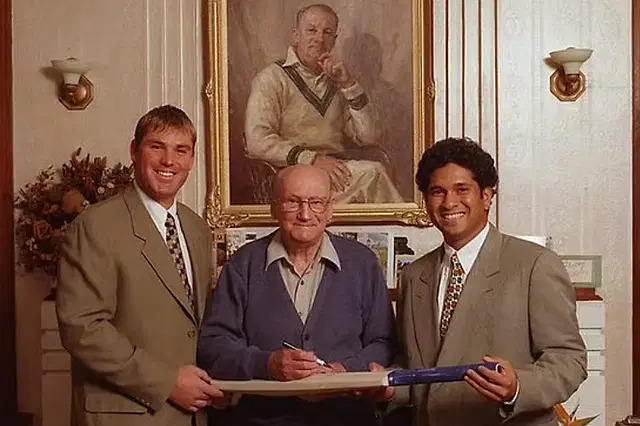In another world, they might be chatting away happily. Meanwhile, we are here, astonished and moved as we read a few letters. The delicate stitches of words he used have unlocked so much! Queen Elizabeth II, the fall of socialism in Russia, Australia’s 24th Prime Minister Paul Keating, the assassination of Rajiv Gandhi, Margaret Thatcher, and Shane Warne. Ah, Warne! How deeply Bradman admired the late leg-spin wizard. It’s no wonder I mentioned them chatting away in another world. Meanwhile, we are rediscovering Bradman’s thoughts on batting in over 20 letters, as if for the first time. It wasn’t just about batting; his insights stretched far beyond that!
These letters were written by Sir Don Bradman between 1984 and the mid-1990s. The recipient was his English friend, Peter Braf, a famous radio voice of the 1950s. Bradman and Braf became friends in the 1930s when Braf’s father, Arthur, met the Australian team during their England tour. Their friendship continued through letter exchanges for many years. Surely, Braf too must have enjoyed chats with Warne and Bradman! Braf passed away in 1999, two years before Bradman. Later, Braf’s family donated Bradman’s letters to Australia’s National Library. From these letters, we can learn about Bradman’s thoughts, intricately stitched together with affection for Warne.
In a letter dated February 10, 1998, Bradman discusses Warne. Bradman had lost his wife the previous September, which cast a heavy shadow over the letter’s tone. “I’m struggling to come to terms with life. Everywhere I look, there’s only sorrow and memories. Even after a golf match or a game of bridge, there’s no one to talk to. You (Braf) were right, the nights are lonely. I no longer watch cricket, I can’t stand the journalists… I’m living a lonely life. Thank God for the television…”
Bradman then turns to Warne’s performance in the series against South Africa: “The real difference was Warne. Watching him bowl at the Sydney Test was a marvelous sight; the ball was turning, it was a brilliant display. Our boys will be facing similar conditions in India this week. Tendulkar is probably the best batsman in the world right now, and his battle with Warne will be fascinating.”
Warne debuted in first-class cricket in February 1991, at a time when Bradman had witnessed the decline of leg-spin as a craft. Warne’s rise inspired him. In a May letter, Bradman expressed concern: “The sad thing about modern cricket is the death of slow leg-spinners. At first, it seemed like One-Day cricket was to blame, where economy became everything, and taking wickets didn’t matter as much.”
Warne made his Test debut for Australia in January 1992, and by then, Bradman had begun following him closely. In a letter dated March 15, 1993, Bradman wrote: “Thank God, we have found a good leg-spinner in young Warne. He’s only 23 and can really get the ball to turn. His accuracy is superb. In the current Test against New Zealand, he’s giving less than two runs per over, which is extraordinary. He should do well in England too.”
Bradman’s prediction was spot-on. Warne’s “Ball of the Century” in the 1993 Ashes series is legendary. That was Warne’s first delivery in England. Australia won the series 4-1. Bradman wrote in his letter: “Our boys played well, and they deserve the praise. It was thrilling to see a young leg-spinner turn the ball like that after Fleetwood-Smith. He also kept the runs down. It’s time to look beyond the endless procession of fast bowlers.”
In a letter written 18 months later, in November 1994, Bradman once again praised Warne’s bowling: “Shane Warne is bowling brilliantly and creating all sorts of problems. Apart from (Bill) O’Reilly, Warne is our best slow leg-spinner. Even better than (Clarrie) Grimmett, which is a huge compliment.”
In another letter, Bradman shared his experience dining with Queen Elizabeth II. In May 1986, he was invited to lunch on the Queen’s royal yacht. He wrote on May 11 of that year: “There were 70 special guests… I sat at the Queen’s table. She looked lovely, spoke cheerfully like an ordinary person. No pretensions. After she left, the steward and others surrounded me, asking for autographs, which I found a bit annoying.”
Bradman also expressed his dislike for former Australian Prime Minister Paul Keating. In a letter dated August 29, 1991, he wrote, “I’m so glad socialism is over. It was a cunning and wicked ideology.”
In the same year, Bradman was saddened by Margaret Thatcher’s resignation as Britain’s Prime Minister. After Rajiv Gandhi’s assassination, he wrote, “At least we’re free from such things here in Australia.” He also expressed his joy when Bruce Reid and Steve Waugh were included in the Australian team. In November 1989, he wrote about Martin Crowe: “He surely belongs in the top three batsmen in the world. He has an excellent technique, though his only weakness is a lack of aggression. But he’s a wonderful model.”






